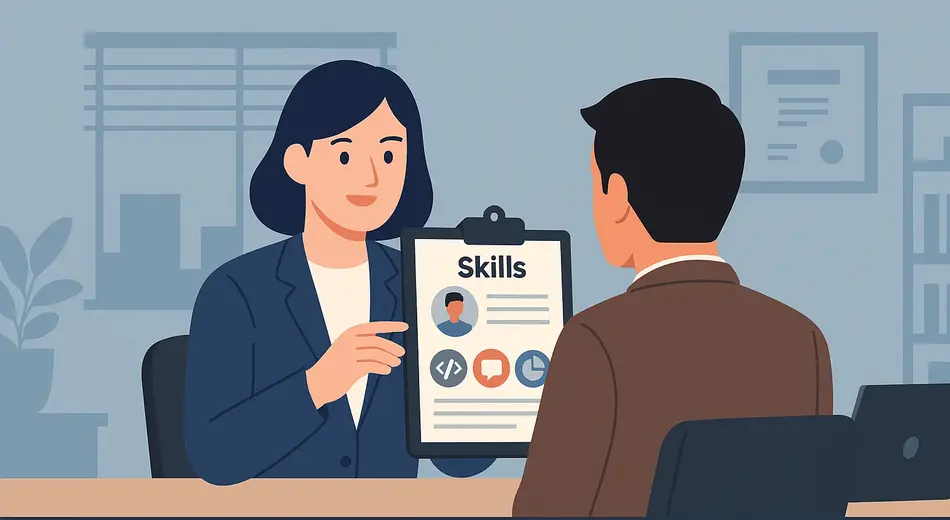Introduction
The hiring landscape is rapidly evolving, and in 2025, skills-based hiring is at the forefront of this revolution. For job seekers, understanding this shift is crucial to landing your next role. This comprehensive guide will walk you through what skills-based hiring is, why it’s gaining traction, the types of skills and assessments you’ll encounter, and how to prepare for success. We’ll also cover red flags to watch for, practical tips, an FAQ, and a real-world success story to inspire your journey.
What is Skills-Based Hiring?
Skills-based hiring is a recruitment approach where employers prioritize a candidate’s abilities and competencies over traditional credentials like degrees or years of experience. Instead of focusing solely on your resume, organizations assess your actual skills through various methods to determine if you’re the right fit for the job.
Why Are Organizations Adopting Skills-Based Hiring?
- Wider Talent Pool: By removing degree requirements, companies can access a broader and more diverse range of candidates.
- Better Job Fit: Assessing real skills ensures candidates can perform the tasks required, leading to higher productivity and lower turnover.
- Faster Hiring: Skills assessments can streamline the recruitment process, reducing time-to-hire.
- Focus on Potential: Employers can identify high-potential candidates who may have been overlooked due to non-traditional backgrounds.
Why Organizations Are Adopting Skills-Based Hiring
From accessing a wider talent pool to reducing time-to-hire, skills-based hiring is reshaping recruitment. Employers who focus on real skills find better job fit, higher productivity, and stronger retention. Post your job on WhatJobs today and connect with skilled candidates ready to perform from day one.
Post a Job Free for 30 Days →Types of Skills Assessed
- Technical Skills: Programming, data analysis, digital marketing, etc.
- Soft Skills: Communication, teamwork, problem-solving, adaptability.
- Job-Specific Skills: Sales techniques, customer service, project management.
- Transferable Skills: Skills that apply across industries, such as leadership or time management.
Three Types of Skills Assessments
| Assessment Type | Description | Examples |
|---|---|---|
| Online Assessments | Automated tests or quizzes that evaluate your knowledge and abilities in specific areas. | Coding challenges, language proficiency tests, situational judgment tests |
| Live Assessments | Real-time evaluations conducted via video call or in person. | Interviews with practical exercises, role-plays, group tasks |
| Take-Home Assignments | Projects or tasks you complete independently on your own time. | Writing a report, designing a presentation, solving a business problem |
How to Prepare for Skills Assessments
- Research the Role: Understand the key skills required for the position and review the job description carefully.
- Practice Common Assessments: Use online platforms to practice coding, problem-solving, or other relevant tests.
- Review Your Work: For take-home assignments, double-check your work for accuracy and clarity before submitting.
- Simulate Live Scenarios: Practice with friends or mentors to get comfortable with live assessments and interviews.
- Show Your Process: Employers value seeing how you approach problems, not just the final answer.
Red Flags to Watch For
- Unclear Instructions: If the assessment lacks clear guidelines, ask for clarification.
- Excessive Unpaid Work: Be wary of companies that require large, unpaid projects as part of the hiring process.
- No Feedback: A reputable employer should provide feedback or at least acknowledge your effort.
- Unreasonable Deadlines: Assessments should allow enough time to demonstrate your skills without undue pressure.
Practical Tips for Success
- Be Honest: Don’t exaggerate your abilities. If you’re unsure about a skill, be upfront and show your willingness to learn.
- Highlight Transferable Skills: Even if you lack direct experience, showcase how your skills apply to the new role.
- Stay Organized: Keep track of deadlines and requirements for each assessment.
- Ask Questions: Clarify expectations and don’t hesitate to seek help if needed.
- Follow Up: After completing an assessment, send a thank-you note and express your continued interest.
FAQ: Skills-Based Hiring
Q: Do I need a degree for skills-based hiring?
A: Not necessarily. Many employers are removing degree requirements and focusing on your actual skills and abilities.
Q: What if I fail a skills assessment?
A: Use it as a learning opportunity. Ask for feedback and work on improving for future opportunities.
Q: How can I showcase my skills if I lack formal experience?
A: Highlight projects, volunteer work, or personal initiatives that demonstrate your abilities.
Q: Are skills assessments fair?
A: When designed well, they can be more objective than traditional interviews. However, always watch for red flags like unclear instructions or excessive unpaid work.
Real-World Example: Success with Skills-Based Hiring
Meet Priya: After graduating with a degree in literature, Priya struggled to land a marketing job due to her non-traditional background. She focused on building digital marketing skills through online courses and freelance projects. When she applied for a marketing coordinator role, the company used a skills-based hiring process. Priya completed an online marketing assessment, a take-home campaign proposal, and a live presentation. Her practical skills and creative approach impressed the hiring team, and she landed the job—despite competing with candidates who had marketing degrees. Priya’s story shows that with the right preparation and mindset, skills-based hiring can open doors for job seekers from all backgrounds.
Conclusion
Skills-based hiring is transforming the job market in 2025. By understanding what to expect and preparing effectively, you can stand out and succeed in this new landscape. Focus on building and demonstrating your skills, stay proactive, and embrace the opportunities that skills-based hiring offers.




